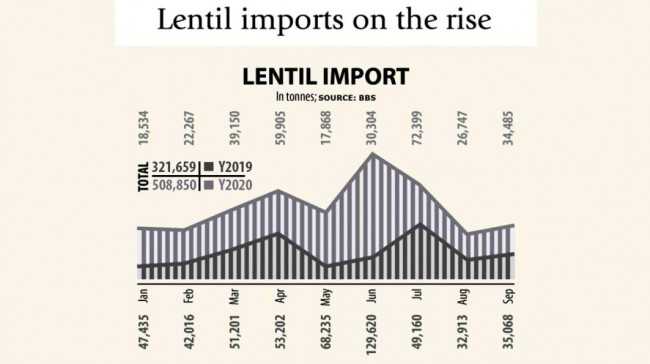Lentil imports increasing

Image: Collected
Lentil imports increasing
Bangladesh's lentil imports are on the rise because of increased consumption amid inadequate domestic development.
Farmers produce 1.75 lakh tonnes of lentils annually while various businesses and importers declare that the country's yearly need is just about 6-7 lakh tonnes.
Lentil imports hit 5.21 lakh tonnes between July-September of 2020, a 58 per cent increase when compared to same period the entire year before, info from the Bangladesh Bureau of Figures shows.
"Consumption is raising and imports have shot up," explained Abul Bashar Chowdhury, chairman of BSM Group, among the top rated importers of consumer goods.
The ongoing coronavirus pandemic in addition has boosted the demand for pulses as many people want in order to avoid animal based protein in concern with infection.
Annual imports stood at around 2 lakh tonnes four to five years back.
"It would appear that farmers will be switching to high-value crops searching for higher incomes. We used to see downward pressure on prices when domestically developed lentils would get to the market during the harvesting season but we didn't see such pressure during the last four-five years," he added.
Legumes are also a sensitive crop seeing that rainfall and higher temperature ranges affect yields and so, the cultivation and option of lentils and pulses features declined.
"We've also become reliant on imports for peas," Chowdhury said.
Shafi Mahmud, president of the Bangladesh Pulse Investors Association, said pulse cultivation has dropped over time and the shortfall in supply is normally met through imports from Australia, Turkey, Canada and Nepal.
"Once we used to find pulse fields spread sporadically from Amin Bazar of Savar to Aricha of Manikganj but they aren't seen that much nowadays," he said,
Now, farmers manufacture lentils and pulses practically solely for his or her own consumption.
Mahmud, who possesses been engaged found in pulse trade since 1980, said they employed to find pulses arriving from differing of the country with their wholesale.
"We'd receive 1,200-1,500 totes of pulses from Barishal inside our store but that's almost absent nowadays," he stated, adding that imports began increasing slowly from 2005.
Anup Kumar Saha, deputy executive director of ACI Client Brands, said low yields could possibly be another reason behind low development of lentils.
"So why would some grow lentils if indeed they can't make earnings?" he said.
Chowdhury said a whole lot of thrust was presented with on research to build up improved types of rice.
Crops want pulse, onion, wheat didn't receive adequate focus in the event of research.
Due to this fact, production has not risen to that extent and import dependence has increased, he said while suggesting that steps should be taken up to develop improved types of pulses and other commodities that Bangladesh highly depends upon imports.
Source: https://www.thedailystar.net
Previous Story
- Why the globe is watching Australia's new big-tech...
- AAPA Says Vaccines Shouldn’t Be Required For Travel
- Trade contract with Nepal soon: minister
- What the brand new trade bloc opportunity for...
- Why Bangladesh isn't portion of the mega trade...
- Bangladesh overlooks RCEP despite the threat of competition
- China cotton ban raises fears of new trade...
- Bangladesh praying for trade benefits post LDC graduation